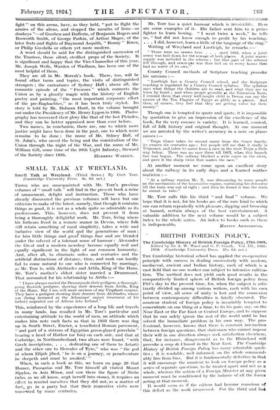SMALL TALK AT WREYL - AND.
Small Talk at Wreyland. (Third Series.) By Cecil Torr. (Cambridge University Press. 8s. 6d. net.) THOSE who are unacquainted with Mr. Torr's previous volumes of " small talk " will find in the present book a mine of amusement, delight and instruction. Those who have already discovered the previous volumes will have but one criticism to make of the latest, namely, that though it contains things as good, it is not as a whole quite so admirable as its
predecessors. This, however, does not prevent it from being a thoroughly delightful work. Mr. Torr, living where his forbears lived in a remote manor in Devon, where folk still retain something of rural simplicity, takes a wide and inclusive view of the world and the generations of man : for him little things and great things fuse and are blended under the solvent of a tolerant sense of humour : Alexander the Great and a modern newsboy become equally real and equally significant in the light of our common humanity. And, after all, to eliminate miles and centuries and the artificial distinctions of distance, time, and rank can hardly fail to come natural to one who is connected by marriage, as Mr. Torr is, with Alcibiades and Attila, King of the Hum. Mr. Torr's mother's eldest . sister . married a Drummond. That accounted for his relationship to Attila :-
" I have always envied the Drurrimonds their pedigree, a thorough- going Scottish -pedigree, showing their descent from Attila, King of the Runs. But I am still more envious of thy-Urquhart cousins. They have a pedigree showing their descent from Alcibiades, whose son (being incensed at the Athenians' unjust treatment of his father) migrated out of Athens into Ireland."
This, reinforced by the experiences of a long life and travels in many lands, has resulted in Mr. Torr's particular and entertaining attitude to the world of men, an attitude which makes him note such facts as that in 1833 there was dug up in South Street, Exeter, a tessellated Roman pavement, " and part of a sistrum of Egyptian green-glazed porcelain " bearing a head of Hathor (or Isis) on each side, and that at Corbridge, in Northumberland,-two altars were found, " with Greek inscriptions, . . . dedicating one of them to Astarte and the other one to Hercules of Tyre," who was " the god at -whom Elijah jibed, ` he is on a journey, or peradventure he sleepeth and must be awaked.' " When, in. such a book as this, we learn on page 29 that Homer, Pausanias and Mr, Torr himself all visited Mount Sipylos, in Asia Minor, and saw there the figure of Niobe (who, as we all know, wept herself into stone), it requires an effort to remind ourselves that they did not, as a matter of fact; go in a party but that their respective visits were separated by many centuries. - Mr. Torr has a quiet humour which is irresistible. Here are some examples of. it. His father sent him to a prize- fighter to learn boxing. " I went twice a week," he tells us, " but did not know enough to profit by his teaching. . . . I did, however, learn a little of the language of the ring."
Writing of Wreyland and Lustleigh, he remarks :—
" There were no sewers here . . . until 1892, when a joint sewer was laid down for the sewage of both places. A joint water- supply was included in the scheme ; but. that part of the scheme fell through, and sewer-gm was thus laid on to every house that had no water of its own."
County Council methods of Scripture teaching provoke his sarcasm :-
"Lustleigh has a County Council school, and the Scripture teaching is regulated by -a County Council syllabus. The syllabus says what things the children are to read, and what they are to learn by heart ; and when people grumble at the Education Rate, I remind them that every well-taught child in Devon can say the names of the Ten Plagues of Egypt as glibly as a parrot. And then, of course, they feel that they are getting value for their
money." •
Though one is tempted to quote and quote, it is impossible by quotation to give an impression of the excellence of the book, for its very essence is variety. It is learned, comical, full of folk history and original thought. At one moment we are arrested by the writer's accuracy in a note on place- names
Teign Grace takes its second name from the Grace family, its owners six centuries ago ; but people tell me that it really is Teignrace, and takes its name from a race in the river Teign a little way below. There was no race there till 1863, when this branch line was begun. The railway blocked a wide curve in the river, and gave it the sharp twist that makes the race."
At another moment we come upon an excellent story about the railway in its early days and a learned mathe- matician :-
" At a railway station Mr. X. was discoursing to some people on the mechanism of the locomotive engine, continuing his discourse till the train was out of sight ; and then he found it was the train he meant to take."
Mr. Torr calls this his third " and final " volume. We hope that it is not, for his books are of the rare kind to which one can return repeatedly with pleasure, dipping and browsing at hazard, certain always of the best entertainment. A valuable addition to the next volume would be a subject index to the whole series. An index to books such as these










































 Previous page
Previous page